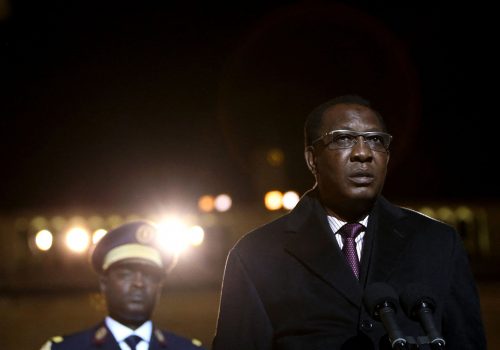Commercial opportunities abound in young, urban, and integrated African markets
On Tuesday, April 20, the Africa Center hosted a special event on strengthening US-Africa commercial ties featuring an esteemed panel of stakeholders representing US corporations with significant African operations, the leading global green growth fund, and a creative sector champion. The event also served as the launch of Africa Center Senior Fellow Ms. Aubrey Hruby’s new long-awaited report, Priorities for US-Africa Commercial Policy in the Biden Administration.
Panelists included Ms. Mo Abudu, chief executive officer of EbonyLife Media; Mr. Pa Ousman Jarju, director of the division of country programming at the Green Climate Fund; Amb. Demetrios Marantis, senior vice president for global government affairs at Visa; Mr. Olivier Puech, executive vice president and president for Latin America and EMEA at American Tower Corporation; and Mr. Aziz Rahman, managing director and co-head, EMEA Emerging Markets Corporate Bank at Citi.
In her opening remarks, Africa Center Director Amb. Rama Yade acknowledged the report launch as a milestone in the Center’s Afro-Century Initiative. This program, supported by the Africa Finance Corporation, aims to construct a more authentic, optimistic narrative on Africa, viewing the continent in terms of opportunity and not risk. She noted that the early actions of the Biden administration reflect this optimism and offer hope for renewed and expanded US-Africa ties.
Before moderating the discussion, Hruby laid out key recommendations from her report, including the need for a digital infrastructure focus, for the United States to make good on its climate pledges, and to support people-to-people ties by harnessing the creative industries through a creative industries council.
Find key takeaways across these themes below:
“Huge opportunity”
For Marantis, Visa sees “staggering” growth in sectors like e-commerce and the opportunity for a post-COVID digital transformation.
To Abudu, “in 2018 the world woke up” and “business opportunity for us in the entertainment industry is massive,” referring to an unprecedented expansion in entertainment deals, including EbonyLife Media’s partnerships with Netflix, Sony, and AMC Networks. These investments support a broader ecosystem and productive value chain on the continent.
For Puech, “the potential is huge, not only in business terms. . . but also in terms of corporate social responsibility.” American Tower Corporation, for example, endeavors to support sustainable solutions in the societies it works in, providing “digital villages” and electrification.
A digital imperative
The “explosion of electronic commerce” that Marantis mentioned underscores that businesses that are digitally enabled are best placed to succeed. Visa supports this trend through a commitment to digitally enable fifty million businesses over the course of the next three years. It is also this digital environment and supply chain that will allow small and micro businesses to engage, building critical US-Africa ties below the Fortune 500 level.
Innovative green instruments
Africa is one of the most vulnerable regions to the impacts of climate change. Fortunately, Jarju and the Green Climate Fund (GCF) support conservation efforts, while enhancing livelihoods. Support is “based on instruments to leverage blended finance and crowd in private sector investment for developing countries.” The GCF helps de-risk investments by providing first-loss provisions, a structure that incentivizes investors to look at emerging opportunities.
Keys to engagement
“The start is really on the regulatory agenda of the government,” Puech noted. “Open, competitive, and predictable business environments” are key. Progress has been made but room for growth remains.
The African Continental Free Trade Area (AfCFTA) must also reduce barriers to data, according to Marantis, or else small and medium enterprises will not have the tools to succeed.
For Rahman, Citi’s seventy-year tenure in African markets is founded on “consistent, patient policy” following trends in a sustainable and efficient manner. A longer-term view is needed, which can be a lesson for companies considering investments. As Hruby and Abudu agreed, “persistence certainly pays in African markets.”
Big ideas for the Biden-Harris administration
To conclude, Hruby asked for big ideas for the Biden-Harris administration’s Africa policy. Marantis doubled down on the need to support e-commerce and a digitally inclusive environment, referencing opportunities for a digital trade agreement or a digital infrastructure play through the US International Development Finance Corporation. Rahman highlighted the tremendous opportunity to enable the mobilization of capital, and Puech noted the need to harness the collective intelligence of the US business community.
Missed the event? Watch the webcast below and engage us @ACAfricaCenter with any questions, comments, or feedback.


